Recent Posts
 Select Group of Men Left County in Oct. 1918 for World War Service October 26, 2015 Military - According to a Thursday, Oct. 24, 1918 Johnson City Daily Staff newspaper, a determined looking and likely-nervous squad of young recruits from Washington County, assembled at the Southern Railway Depot on the afternoon of the 23rd. They were there to begin preparations for the next morning's rail journey to Camp Wadsworth in Spartanburg, SC. Street… Continue Reading
Select Group of Men Left County in Oct. 1918 for World War Service October 26, 2015 Military - According to a Thursday, Oct. 24, 1918 Johnson City Daily Staff newspaper, a determined looking and likely-nervous squad of young recruits from Washington County, assembled at the Southern Railway Depot on the afternoon of the 23rd. They were there to begin preparations for the next morning's rail journey to Camp Wadsworth in Spartanburg, SC. Street… Continue Reading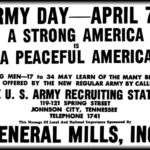 President Truman Proclaimed “Army Day and Week” in 1947 September 14, 2015 Military - On March 7, 1947, Harry S. Truman, our 33rd President of the United States issued Proclamation 2719, establishing: "Army Day and Army Week, 1947 by the President of the United States of America. A proclamation: Army Day and Week Proclaimed, 1947, Sponsored by General Mills, Inc. "Whereas the Army of the United States is a… Continue Reading
President Truman Proclaimed “Army Day and Week” in 1947 September 14, 2015 Military - On March 7, 1947, Harry S. Truman, our 33rd President of the United States issued Proclamation 2719, establishing: "Army Day and Army Week, 1947 by the President of the United States of America. A proclamation: Army Day and Week Proclaimed, 1947, Sponsored by General Mills, Inc. "Whereas the Army of the United States is a… Continue Reading New 1954 Armory Provided Additional Meeting Facilities for City September 29, 2014 Military - Official announcement that a $500 thousand National Guard armory would be constructed in Johnson City was welcomed by numerous organizations who had long wished for such a place to hold meetings. The new facility was located on a 30-acre tract of land just off the New Jonesboro Highway (11E, left side traveling west) near what… Continue Reading
New 1954 Armory Provided Additional Meeting Facilities for City September 29, 2014 Military - Official announcement that a $500 thousand National Guard armory would be constructed in Johnson City was welcomed by numerous organizations who had long wished for such a place to hold meetings. The new facility was located on a 30-acre tract of land just off the New Jonesboro Highway (11E, left side traveling west) near what… Continue Reading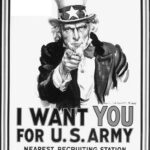 1950 Milligan College Student Publication Spelled Out Draft Rules February 27, 2012 Military - The Selective Service Act was implemented during Woodrow Wilson's presidency in 1917 because the government wanted to ensure that the country’s military services had enough qualified men. The new law resulted in many Americans being called for combat in World War I. When President Franklin Roosevelt signed the Selective Training and Service Act of 1940,… Continue Reading
1950 Milligan College Student Publication Spelled Out Draft Rules February 27, 2012 Military - The Selective Service Act was implemented during Woodrow Wilson's presidency in 1917 because the government wanted to ensure that the country’s military services had enough qualified men. The new law resulted in many Americans being called for combat in World War I. When President Franklin Roosevelt signed the Selective Training and Service Act of 1940,… Continue Reading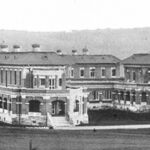 Veteran Speaks of Pleasant Living at Soldiers’ Home in 1904 September 12, 2011 Military - In November 1901, newspapers across the country touted the beautiful new National Home for Disabled Volunteer Soldiers (N.H.D.V.S.). The heading of one newspaper was “A Great Soldiers’ Home.” The facility was also commonly referred to as Mountain Home. Another publication stated that when it was finished, it would be one of the most notable groups… Continue Reading
Veteran Speaks of Pleasant Living at Soldiers’ Home in 1904 September 12, 2011 Military - In November 1901, newspapers across the country touted the beautiful new National Home for Disabled Volunteer Soldiers (N.H.D.V.S.). The heading of one newspaper was “A Great Soldiers’ Home.” The facility was also commonly referred to as Mountain Home. Another publication stated that when it was finished, it would be one of the most notable groups… Continue Reading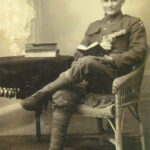 World War I Diary Offers Glimpse of JC Man’s Military Service June 27, 2011 Military - Today’s column is derived from correspondence I received from local residents, Patricia Crowder and Barbara Hobson, daughters of Wm. Roscoe “Ross” Grindstaff who served his country during World War I in France, Germany, Luxemburg and Belgium. An unidentified soldier from William’s unit penned in beautiful cursive writing a short diary of their division’s travels. When… Continue Reading
World War I Diary Offers Glimpse of JC Man’s Military Service June 27, 2011 Military - Today’s column is derived from correspondence I received from local residents, Patricia Crowder and Barbara Hobson, daughters of Wm. Roscoe “Ross” Grindstaff who served his country during World War I in France, Germany, Luxemburg and Belgium. An unidentified soldier from William’s unit penned in beautiful cursive writing a short diary of their division’s travels. When… Continue Reading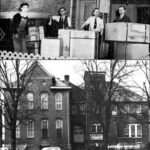 Artcraft Glove Company Arrived in JC in 1943, Remained 30 Years March 28, 2011 Military - In 1943, there arose a need for increased production of quality gloves brought about by the war effort and increasing civilian demands. Tom Lee, in his excellent book, The Tennessee-Virginia Tri-Cities (U.T. Press, 2005) noted that during World War II “while wartime demand increased manufacturing activity across the Tri-Cities area, the distribution of major new… Continue Reading
Artcraft Glove Company Arrived in JC in 1943, Remained 30 Years March 28, 2011 Military - In 1943, there arose a need for increased production of quality gloves brought about by the war effort and increasing civilian demands. Tom Lee, in his excellent book, The Tennessee-Virginia Tri-Cities (U.T. Press, 2005) noted that during World War II “while wartime demand increased manufacturing activity across the Tri-Cities area, the distribution of major new… Continue Reading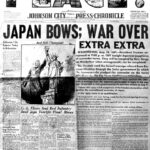 Columnist Recalls City’s Reaction to News That War Was Over August 17, 2009 Military - The August 14, 1945 Johnson City Press Chronicle headline with "PEACE" written across the top of it in large bold letters said it all: "Japan Bows; War Over” - Washington, Aug. 14 (AP) - President Truman announced at 7:00 p.m. EWT (Eastern War Time) tonight. - Japanese acceptance of surrender terms. They will be accepted… Continue Reading
Columnist Recalls City’s Reaction to News That War Was Over August 17, 2009 Military - The August 14, 1945 Johnson City Press Chronicle headline with "PEACE" written across the top of it in large bold letters said it all: "Japan Bows; War Over” - Washington, Aug. 14 (AP) - President Truman announced at 7:00 p.m. EWT (Eastern War Time) tonight. - Japanese acceptance of surrender terms. They will be accepted… Continue Reading
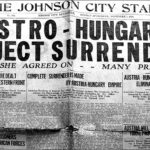 Comparing the First World War Soldier with the Civil War Combatant August 22, 2016 Military - The Nov. 4, 1918 Johnson City Staff offered enlightening news about the First World War (July 28, 1914 - Nov. 11, 1918). Here is a slightly paraphrase of the commentary: face and hands tanned to the shade of his brown khaki, hat string hanging behind his head and an insolent kind of jaunt as he… Continue Reading
Comparing the First World War Soldier with the Civil War Combatant August 22, 2016 Military - The Nov. 4, 1918 Johnson City Staff offered enlightening news about the First World War (July 28, 1914 - Nov. 11, 1918). Here is a slightly paraphrase of the commentary: face and hands tanned to the shade of his brown khaki, hat string hanging behind his head and an insolent kind of jaunt as he… Continue Reading Select Group of Men Left County in Oct. 1918 for World War Service October 26, 2015 Military - According to a Thursday, Oct. 24, 1918 Johnson City Daily Staff newspaper, a determined looking and likely-nervous squad of young recruits from Washington County, assembled at the Southern Railway Depot on the afternoon of the 23rd. They were there to begin preparations for the next morning's rail journey to Camp Wadsworth in Spartanburg, SC. Street… Continue Reading
Select Group of Men Left County in Oct. 1918 for World War Service October 26, 2015 Military - According to a Thursday, Oct. 24, 1918 Johnson City Daily Staff newspaper, a determined looking and likely-nervous squad of young recruits from Washington County, assembled at the Southern Railway Depot on the afternoon of the 23rd. They were there to begin preparations for the next morning's rail journey to Camp Wadsworth in Spartanburg, SC. Street… Continue Reading President Truman Proclaimed “Army Day and Week” in 1947 September 14, 2015 Military - On March 7, 1947, Harry S. Truman, our 33rd President of the United States issued Proclamation 2719, establishing: "Army Day and Army Week, 1947 by the President of the United States of America. A proclamation: Army Day and Week Proclaimed, 1947, Sponsored by General Mills, Inc. "Whereas the Army of the United States is a… Continue Reading
President Truman Proclaimed “Army Day and Week” in 1947 September 14, 2015 Military - On March 7, 1947, Harry S. Truman, our 33rd President of the United States issued Proclamation 2719, establishing: "Army Day and Army Week, 1947 by the President of the United States of America. A proclamation: Army Day and Week Proclaimed, 1947, Sponsored by General Mills, Inc. "Whereas the Army of the United States is a… Continue Reading New 1954 Armory Provided Additional Meeting Facilities for City September 29, 2014 Military - Official announcement that a $500 thousand National Guard armory would be constructed in Johnson City was welcomed by numerous organizations who had long wished for such a place to hold meetings. The new facility was located on a 30-acre tract of land just off the New Jonesboro Highway (11E, left side traveling west) near what… Continue Reading
New 1954 Armory Provided Additional Meeting Facilities for City September 29, 2014 Military - Official announcement that a $500 thousand National Guard armory would be constructed in Johnson City was welcomed by numerous organizations who had long wished for such a place to hold meetings. The new facility was located on a 30-acre tract of land just off the New Jonesboro Highway (11E, left side traveling west) near what… Continue Reading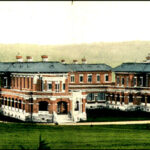 Johnson City’s New National Home for Disabled Veterans in 1903 Was Finest in the World September 30, 2013 Military - In 1903, it was deemed to be the supreme Soldiers' Home in the country. The National Home for Disable Volunteer Soldiers, located near Johnson City in East Tennessee, was only a short journey over the mountains from Asheville, NC, site of Vanderbilt’s immense palace. The Home's grounds were laid out in the shape of a… Continue Reading
Johnson City’s New National Home for Disabled Veterans in 1903 Was Finest in the World September 30, 2013 Military - In 1903, it was deemed to be the supreme Soldiers' Home in the country. The National Home for Disable Volunteer Soldiers, located near Johnson City in East Tennessee, was only a short journey over the mountains from Asheville, NC, site of Vanderbilt’s immense palace. The Home's grounds were laid out in the shape of a… Continue Reading 1950 Milligan College Student Publication Spelled Out Draft Rules February 27, 2012 Military - The Selective Service Act was implemented during Woodrow Wilson's presidency in 1917 because the government wanted to ensure that the country’s military services had enough qualified men. The new law resulted in many Americans being called for combat in World War I. When President Franklin Roosevelt signed the Selective Training and Service Act of 1940,… Continue Reading
1950 Milligan College Student Publication Spelled Out Draft Rules February 27, 2012 Military - The Selective Service Act was implemented during Woodrow Wilson's presidency in 1917 because the government wanted to ensure that the country’s military services had enough qualified men. The new law resulted in many Americans being called for combat in World War I. When President Franklin Roosevelt signed the Selective Training and Service Act of 1940,… Continue Reading Veteran Speaks of Pleasant Living at Soldiers’ Home in 1904 September 12, 2011 Military - In November 1901, newspapers across the country touted the beautiful new National Home for Disabled Volunteer Soldiers (N.H.D.V.S.). The heading of one newspaper was “A Great Soldiers’ Home.” The facility was also commonly referred to as Mountain Home. Another publication stated that when it was finished, it would be one of the most notable groups… Continue Reading
Veteran Speaks of Pleasant Living at Soldiers’ Home in 1904 September 12, 2011 Military - In November 1901, newspapers across the country touted the beautiful new National Home for Disabled Volunteer Soldiers (N.H.D.V.S.). The heading of one newspaper was “A Great Soldiers’ Home.” The facility was also commonly referred to as Mountain Home. Another publication stated that when it was finished, it would be one of the most notable groups… Continue Reading World War I Diary Offers Glimpse of JC Man’s Military Service June 27, 2011 Military - Today’s column is derived from correspondence I received from local residents, Patricia Crowder and Barbara Hobson, daughters of Wm. Roscoe “Ross” Grindstaff who served his country during World War I in France, Germany, Luxemburg and Belgium. An unidentified soldier from William’s unit penned in beautiful cursive writing a short diary of their division’s travels. When… Continue Reading
World War I Diary Offers Glimpse of JC Man’s Military Service June 27, 2011 Military - Today’s column is derived from correspondence I received from local residents, Patricia Crowder and Barbara Hobson, daughters of Wm. Roscoe “Ross” Grindstaff who served his country during World War I in France, Germany, Luxemburg and Belgium. An unidentified soldier from William’s unit penned in beautiful cursive writing a short diary of their division’s travels. When… Continue Reading Artcraft Glove Company Arrived in JC in 1943, Remained 30 Years March 28, 2011 Military - In 1943, there arose a need for increased production of quality gloves brought about by the war effort and increasing civilian demands. Tom Lee, in his excellent book, The Tennessee-Virginia Tri-Cities (U.T. Press, 2005) noted that during World War II “while wartime demand increased manufacturing activity across the Tri-Cities area, the distribution of major new… Continue Reading
Artcraft Glove Company Arrived in JC in 1943, Remained 30 Years March 28, 2011 Military - In 1943, there arose a need for increased production of quality gloves brought about by the war effort and increasing civilian demands. Tom Lee, in his excellent book, The Tennessee-Virginia Tri-Cities (U.T. Press, 2005) noted that during World War II “while wartime demand increased manufacturing activity across the Tri-Cities area, the distribution of major new… Continue Reading Columnist Recalls City’s Reaction to News That War Was Over August 17, 2009 Military - The August 14, 1945 Johnson City Press Chronicle headline with "PEACE" written across the top of it in large bold letters said it all: "Japan Bows; War Over” - Washington, Aug. 14 (AP) - President Truman announced at 7:00 p.m. EWT (Eastern War Time) tonight. - Japanese acceptance of surrender terms. They will be accepted… Continue Reading
Columnist Recalls City’s Reaction to News That War Was Over August 17, 2009 Military - The August 14, 1945 Johnson City Press Chronicle headline with "PEACE" written across the top of it in large bold letters said it all: "Japan Bows; War Over” - Washington, Aug. 14 (AP) - President Truman announced at 7:00 p.m. EWT (Eastern War Time) tonight. - Japanese acceptance of surrender terms. They will be accepted… Continue Reading
Comments are closed.